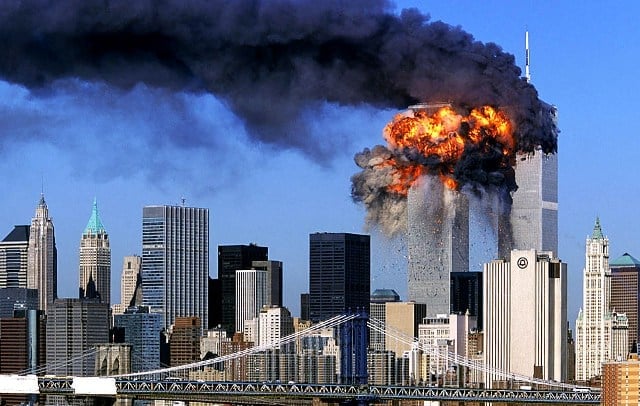9/11 Revelations – Is Washington Now Throwing Riyadh Under the Bus?

All Global Research articles can be read in 51 languages by activating the Translate Website button below the author’s name.
To receive Global Research’s Daily Newsletter (selected articles), click here.
Click the share button above to email/forward this article to your friends and colleagues. Follow us on Instagram and Twitter and subscribe to our Telegram Channel. Feel free to repost and share widely Global Research articles.
***
Recently released court filings outlining how two of the 9/11 hijackers had knowingly or unknowingly been recruited into a joint CIA-Saudi intelligence operation, confirmed what was already open knowledge.
In July 2016, the infamous ‘28 Pages’ section of the official inquiry into the intelligence services activities before and after 9/11 was declassified, outlining the role that high-ranking Saudi officials and intelligence officers had played in the attacks by providing financial and logistical support to the hijackers, 15 of whom were Saudi nationals.
Indeed the Al-Qaeda organisation itself has its roots in Operation Cyclone, a Cold War-era CIA programme involving the arming, funding and training of Wahhabi militants known as the Mujahedeen, who were then sent on to wage war on the Socialist government of previously-Western friendly Afghanistan in 1979. One of the most well-known of the Mujahedeen was none other than Osama Bin Laden.
The 9/11 attacks also served as the pretext for the US to pursue an aggressive foreign policy in line with the aims of Project for the New American Century, a highly-influential Neoconservative think tank which envisaged the United States maintaining global hegemony through radical changes in its military and defence policy, including the removal by force of then-Iraqi President Saddam Hussein. In ominous fashion, a September 2000 report by the PNAC predicted that the implementation of such policy changes would be slow and incremental, and that only an event on the scale of Pearl Harbour would allow for rapid upheaval, with such a catalyst conveniently occurring a year later in New York and Virginia.
In further ominous foreshadowing, retired four-star General Wesley Clark would later recount how on a visit to the Pentagon in the days following 9/11, an unnamed military official had informed him that the decision had been made for the US to go to war with Iraq, despite there being no evidence to link Baghdad to the attacks. In a subsequent follow up meeting a few weeks later when the US had begun bombing Afghanistan, the same official informed Clark that a further six countries – Syria, Lebanon, Libya, Somalia, Sudan and Iran – would be targeted in response to 9/11, despite each one, like Iraq, having no established connection to the attacks.
The timing of the latest release of court documents highlighting Saudi involvement in 9/11 is also highly suspect.
Last month, in a seismic geopolitical shift, it was announced that the Gulf Kingdom and its long-time regional rival Iran, had resumed diplomatic ties in a deal brokered by China. Less than two weeks later, it was announced that Saudi Arabia would also seek to restore diplomatic ties with Syria in talks mediated by Russia, effectively signalling the end of US hegemony in the region.
The release of documents relating to Saudi Arabia’s role in 9/11 in the same timeframe suggests that ties between Washington and what was perhaps its most strategic ally in west Asia after Israel – also with knownconnections to the 9/11 attacks – have now began to go cold following Riyadh’s pivot towards Beijing and Moscow; and in response, Washington has now began to publicise Saudi Arabia’s role in 9/11, possibly in a bid to isolate Riyadh on the world stage.
Indeed, the US throwing former allies under the bus in light of new geopolitical developments has a historical record.
Iran, once a key US-ally in the region, has been the subject of Western sanctions and threats of war since the 1979 Islamic Revolution saw the US and UK-backed Shah Pahlavi overthrown and replaced with Ayatollah Khomeini, with a Syria-style coup attempt currently ongoing in the country.
Neighbouring Iraq would effectively be used as a US-proxy during the Iran-Iraq war that began a year later, with then-Middle East envoy to the Reagan administration and future PNAC member, Donald Rumsfeld, infamously meeting Saddam Hussein in Baghdad in 1983 in order to reiterate US support. Two decades, Rumsfeld would serve as Secretary of Defense in the administration of George W. Bush that would go on to invade Iraq, with Hussein subsequently being executed in the aftermath.
Now, with Riyadh’s pivot eastwards and the publication of documents relating to its role in 9/11 in the same period, it would appear that this historical trend is now beginning to take place in Saudi Arabia.
*
Note to readers: Please click the share button above. Follow us on Instagram and Twitter and subscribe to our Telegram Channel. Feel free to repost and share widely Global Research articles.
Gavin O’Reilly is an activist from Dublin, Ireland, with a strong interest in the effects of British and US Imperialism. Secretary of the Dublin Anti-Internment Committee, a campaign group set up to raise awareness of Irish Republican political prisoners in British and 26 County jails. His work has previously appeared on American Herald Tribune, The Duran, Al-Masdar and MintPress News. He is a regular contributor to Global Research. Support him on Patreon.
Featured image is from The Greanville Post


No comments:
Post a Comment